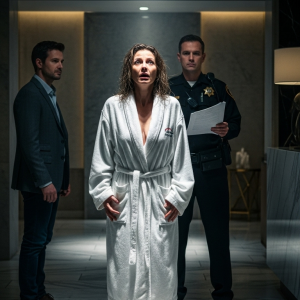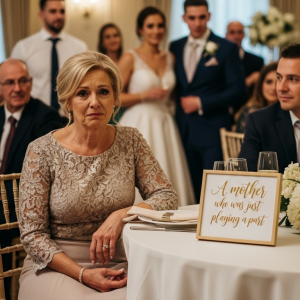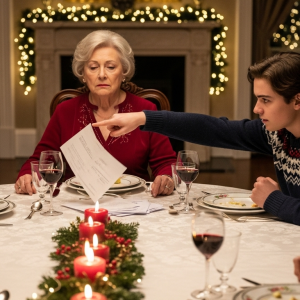Returning from a week in Colorado, all Audrey Wilson wanted was to sink into her favorite armchair with a cup of tea. Instead, a taxi dropped her off in front of her house to find four suitcases neatly lined up on the sidewalk. A single, ominous note was tucked under the handle of the largest one. The handwriting was unmistakable: sharp, hurried, and vaguely hostile. It was Vanessa’s.
“If you want to stay here, we have the garage.”
“Your loving daughter-in-law.”
Audrey’s hands trembled as she read the words. This wasn’t just a betrayal; it was a physical manifestation of everything she’d feared. She’d lived in this house for 35 years, a home she and her late husband, Richard, had built from the ground up. Richard was gone, but the foundation of their life, their dreams, still stood here. A heavy drop of rain splashed on her forehead, a tear from the sky mirroring the ones she was struggling to hold back.
Before the taxi even pulled away, Audrey fumbled for her phone and dialed the bank. “Mrs. Wilson,” the representative said, their voice a soothing balm against the building storm, “we show your automatic payment of $1,867 went through last Friday as scheduled.” A small, bitter victory. She was still paying for this house, this life, that was no longer hers. The sky opened up then, a torrential downpour that seemed to give her permission to break down. She stood there, a 68-year-old woman, watching her life get drenched, and a slow-burning rage began to take hold
The garage door was unlocked, a symbolic opening to her new, diminished existence. Inside, a twin mattress lay against the wall, a small nightstand beside it. Her clothes were crammed onto a portable rack. Her books, photos, and keepsakes were stacked in boxes labeled “Mom’s Stuff” in Vanessa’s neat, damning handwriting. She sank onto the thin mattress, the cold concrete seeping into her bones. Through the small, grimy window, she could see the silhouette of her home, her son, and the life that had cast her aside.
A text from Gregory buzzed on her phone, as if to confirm her fears. “Mom, we need the space. Vanessa has been asking for a home office for months. The garage apartment has everything you need. Don’t make this difficult.” The words sliced through her. Don’t make this difficult. As if her heartbreak, her displacement, was just a hurdle in their grand plans. The tears she’d held back earlier finally came, hot and silent. This was the same son she’d taken a second job for to pay for his college, the son for whom she’d sacrificed her weekends to watch his children. Now, she was a problem to be solved, an inconvenience to be tucked away.
She didn’t respond to Gregory. Instead, she called Martha, her oldest friend. “They put me in the garage,” she managed to choke out. Martha didn’t ask for details, didn’t demand an explanation. “I’ll be there in 20 minutes,” she said. As Audrey sat there, surrounded by the remnants of her life, she made a quiet vow. They had no idea who they were dealing with. She wasn’t just Gregory’s mother, or Richard’s widow. She was Audrey Wilson. And she was done being invisible,
Martha’s spare bedroom was a sanctuary, a haven with a lock on the door and windows that let in real sunlight. Over a cup of coffee, Audrey confessed everything. The house she’d signed over, the mortgage she’d continued to pay, the gradual erosion of her space and her identity. “They took advantage,” Martha said, her voice a low growl. “And Gregory just stood there and let it happen?” “He said I was being difficult,” Audrey said, the words tasting like ash. “That I needed to adapt to the ‘new normal’.”
Just then, her phone buzzed with another text from Gregory. “Mom, when are you coming to get the rest of your things? We need to convert the garage for Emma’s playroom.” Audrey showed the message to Martha, her hand trembling. “That ungrateful…” Martha began, cutting herself off. “Audrey, there’s something you should know. I didn’t want to tell you, but you deserve the truth.” Audrey’s stomach tightened. “Last month at book club, Vanessa had a few drinks. She said they’re putting the house on the market. They want to buy a new construction in Oakwood Hills.” The news hit Audrey like a physical blow. They were going to sell her home, the repository of a lifetime of memories, without a second thought. “What am I going to do?” she whispered. Martha’s eyes hardened. “First, you’re going to stop paying their mortgage. And second, you’re going to talk to my nephew, Brian. He’s a lawyer.”
The next day, Audrey found herself on the porch of her own home, ringing the doorbell like a stranger. The door opened, and Vanessa’s tight smile confirmed Audrey’s worst suspicions. The living room had changed again. My reading lamp was gone, the family photos rearranged, with several of Richard now missing. Gregory emerged from the kitchen, wiping his hands on a dish towel, his expression a mix of annoyance and discomfort. “Mom, what are you doing here?” he asked.
“I came to talk about the house,” Audrey said, her voice surprisingly steady. “Martha told me you’re planning to sell it.” Their exchanged glance was all the confirmation she needed. “We were going to tell you,” Gregory mumbled, not meeting her eyes.
“Finalized?” Audrey echoed. “This was my home for 35 years. Your father and I built this house, we raised you here.”
“Audrey, we understand you have sentimental attachments,” Vanessa said, sighing dramatically, “but we need to do what’s best for our family now.”
Audrey took a deep breath. “For the past two years, I’ve been paying the mortgage. Every month, $1,867 from my account to keep a roof over your heads.” They had known, of course. Their silence was a confession. “That was your choice,” Vanessa said coolly. “We never asked you to do that.”
The words were a final, devastating blow. “So my 35 years here, my financial support, my role in this family… none of that matters?” Gregory shrugged, looking uncomfortable but unmoved. “Mom, you signed the house over to us. It’s our property now. We get to decide what happens to it.” That’s when Audrey knew. The son she’d raised, the boy she’d loved with every fiber of her being, was gone. In his place stood a stranger.
“I’ve stopped the automatic mortgage payments,” she said quietly. Gregory’s face went white. “You what?”
“If you want to sell my home,” Audrey said, her voice steel, “you’ll need to pay for it yourselves.”
“You can’t do that!” Vanessa’s voice rose in a frantic shriek. “What about our credit? We have plans!”
“Yes,” Audrey said, a flicker of cold satisfaction in her eyes. “I hear Oakwood Hills is lovely this time of year.” As she turned to leave, she paused at the door, looking back at her son. “Your father would be ashamed of you, Gregory. And for the first time, so am I.” She walked out, closing the door softly behind her, a new, unbreakable strength forged in the heat of her betrayal.
Back at Martha’s, Audrey explained her actions to Brian, the lawyer. “You’ve finally stood up for yourself,” Martha said, her eyes gleaming with pride. Brian, however, was more cautious. “It’s a good first step, but we need to protect you legally. If your name isn’t on the title, you could be liable for the missed payments without any claim to the property.”
The next morning, the call came from First Federal Bank. Audrey answered, her heart pounding. “Mrs. Wilson, this is Trevor Phillips from the mortgage department. We’ve received a request to discuss the situation with your property on Maple Avenue.” Trevor, a kind-faced man, explained something called an equitable lien. “By consistently paying the mortgage on a property from which you derive no benefit, you may have established an interest in the property even without being on the title,” he said. Hope, a feeling Audrey had almost forgotten, fluttered in her chest. It meant they couldn’t sell without addressing her lien.
“Your son called this morning,” Trevor continued, lowering his voice. “He seemed unaware of how mortgages work. I explained that missed payments affect credit scores and could eventually lead to foreclosure.” As if on cue, her phone buzzed with a text from Gregory. “Mom, we need to talk about the mortgage ASAP.” For the first time, she didn’t feel the familiar panic. She had leverage. “What would you like to do, Mrs. Wilson?” Trevor asked. The simple question hit her with the force of a revelation. No one had asked her what she wanted in years.
“I want what’s rightfully mine,” she said, surprising herself with the firmness in her voice. Trevor nodded, a respectful expression on his face. “Then let’s make that happen.”
Audrey’s days settled into a new, purposeful rhythm. She started working at Rosy’s Cafe, the help wanted sign catching her eye one afternoon. Her tips were modest, her feet ached, but the satisfaction of earning her own living was something she hadn’t felt in years. She had a life that was entirely her own, separate from Gregory and Vanessa.
One afternoon, Gregory showed up at the cafe, his expensive clothes looking out of place among the checkered tablecloths. “Mom,” he said, his voice soft, “can we talk?” He looked different. Smaller. “We need you to lift the lien and resume the payments just until we can sell the house,” he said, the desperation in his voice thinly veiled.
“And what do I get in return?” Audrey asked, her voice calm.
“We’ll make sure you’re taken care of,” he said, as if offering a great kindness. “There’s a nice senior community in Westbrook…”
“Stop,” Audrey said, raising a hand. “I’ve been taking care of myself and you for years. I’m not interested in being ‘taken care of’.” She looked around the cafe, the place that had given her back her purpose. “I’m doing just fine.”
“What do you want?” he asked, his mask of contrition slipping. “A percentage of the sale?”
“I want my home back,” she said. The silence that followed was thick with shock. “That’s not possible,” he stammered. “We’ve already made an offer on the house in Oakwood Hills.”
“Not my problem,” she said.
His face hardened. “It is your problem if you want a relationship with your granddaughter, with any of us.” The threat hung in the air, ugly and explicit. Her own son was using her love as leverage.
“I’ll think about it,” she said finally, her voice betraying no emotion. “But I need something in writing from you and Vanessa. Meet me at Brian Wallace’s office tomorrow at 2 p.m.”
The next day, Audrey sat in Brian’s office, her stomach a knot of nerves. Gregory and Vanessa arrived, dressed for battle. “We appreciate you coming,” Brian began. “Mrs. Wilson has considered your request. This is what she proposes.” Brian slid a document across the desk. Gregory and Vanessa scanned it, their expressions shifting from hope to confusion to pure fury. “What is this?” Gregory demanded.
“That,” Audrey said calmly, “is my condition for lifting the lien. I will resume mortgage payments, but the house will be sold to me, not to strangers.”
“You want us to sell you the house for the remaining mortgage balance? It’s worth at least three times that!” Vanessa shrieked.
“It’s worth exactly what I’ve put into it,” Audrey replied. “35 years of payments, repairs, and improvements.”
Gregory’s face turned an alarming shade of red. “You can’t do this. The house is legally ours.”
“With a lien against it,” Brian pointed out. “Which significantly complicates any potential sale. Legal proceedings will take time. Your credit scores will continue to suffer. And that dream house in Oakwood Hills will go to someone else.”
The truth sank in. They had overextended themselves, counting on a quick sale. “You planned this all along,” Gregory accused, his voice a strained whisper.
“No,” Audrey said quietly. “I just finally stopped allowing myself to be used.”
After a tense, private discussion, they returned. “We’ll accept your offer,” Gregory said stiffly. “But I hope you realize what this means for our relationship.”
“I do,” Audrey said. “And I hope someday you’ll realize what it meant when you put my suitcases on the sidewalk.”
The first night back in her house, Audrey couldn’t sleep. She wandered from room to room, a ghost in her own home. Vanessa’s trendy gray paint and sleek appliances felt impersonal, sterile. But underneath, the house was the same. The creaky third step on the staircase, the way the sunlight filtered through the bay window, the slight tilt in the upstairs hallway that Richard could never quite fix. This house wasn’t just walls and a roof; it was a testament to a life, to survival, to resilience.
Months passed. The house was slowly becoming hers again. She didn’t have the money to replace everything, but she added her own touches: colorful throw pillows, family photos returned to the mantle, and Richard’s fishing gear hung proudly in the den.
One Saturday morning, as she was planting tulips in the front garden, a car pulled into the driveway. Gregory stepped out, looking uncertain and small. “The flowers look nice,” he said.
“What brings you here, Gregory?” she asked, her voice calm.
“We… we didn’t get the house in Oakwood Hills,” he said. “We found an apartment instead. It’s small, but it’s teaching us some perspective, I guess.” He hesitated, then blurted out, “Vanessa’s pregnant again. The baby’s due in January.”
“Congratulations,” Audrey said softly.
He met her eyes for the first time. “Emma asks about you. She doesn’t understand why we don’t visit grandma anymore.”
“She’s welcome here anytime,” Audrey said. “So are you.”
“Mom… I’ve been thinking about everything,” he said, choosing his words carefully. “I’m not saying we handled things well… but you chose a house over your family. I don’t know if I can forgive that.”
Audrey’s momentary hope deflated. “I didn’t choose a house, Gregory. I chose not to be erased. There’s a difference.”
He still didn’t see it. He left shortly after, the distance between them still vast. Later that evening, Audrey sat on her porch swing, surrounded by her chosen family: Martha and Jim, Rosa from the cafe, Brian and his wife. As twilight settled around them, a profound sense of peace washed over her. Martha raised her glass. “To Audrey Wilson, who reminds us all that it’s never too late to reclaim your life.”
Audrey raised her glass in return, her heart full. The house was a testament to her journey. She had been evicted from her home, her son’s life, and her own identity. But she had fought back. She had reclaimed what was hers, not just the house, but herself. She was home, not just in this house, but in her own life.




